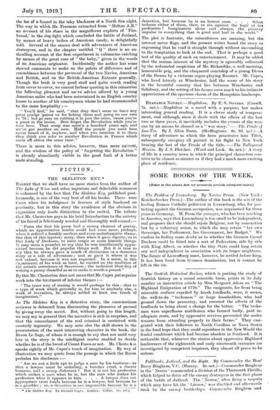FICTION.
THE SKELETON KEY.*
REGRET that we shall have no more stories from the author of The Lake of Wise and other ingenious and delectable romances is enhanced by the fact that The Skeleton Key, published post- humously, is one of the very best of all his books. There were Cates when his indulgence in bravura of style bordered on
preciosity, but in this story the avoidance of the obvious in expression only lends distinction to the recital. The tribute that Mr. Chesterton pays in his brief Introduction to the artistry of his friend is felicitously worded and thoroughly well earned :—
" From the first his prose had a strong element of poetry, which an appreciative reader could feel even more, perhaps, when it refined a frankly modern and even melodramatic theme, like that of this mystery story, than when it gave dignity, as in Our Lady of Darkness, to more tragic or more historic things. It may seem a paradox to say that he was insufficiently appre- ciated because he did popular things well. But it is true to say that he always gave a touch of distinction to a detective story or a tale of adventure ; and so gave it where it was net valued, because it was not expected. In a sense, in this e_egartment of his work at least, he carried on the tradition of the artistic conscience of Stevenson ; the technical liberality of writing a penny-dreadful so as to make it worth a pound."
By this Mr. Chesterton does not mean that Mr. Capes put superior work into the treatment of inferior themes :- " The truer way of stating it would perhaps be this : that to a type of work which generally is, for him or anybody else, a work of invention, he always added at least one touch of imagination."
As The Skeleton Key is a detective story, the conscientious reviewer is debarred from discounting the pleasures of perusal
by giving away the secret. But, without going to this length, we may say in general that the narrative is rich in surprises, and that the concealment of the real criminal is contrived with masterly ingenuity. We may note also the skill shown in the presentation of the most interesting character in the book, the Baron Le Sage, of whom it is enough to say that not until very late in the story is the intelligent reader enabled to decide whether he is of the breed of Count Fosco or not. Mr. Chesteitim speaks rightly of Mr. Capes's touch of imagination. By way of illustration we may quote from the passage in which the Baron preludes his disclosure
" Are we not a little apt to judge a man by his business—as tlint a lawyer must be unfeeling, a butcher cruel, a doctor humane, and a sweep dishonest ? But it is not his profession which makes a man what ho is, but the man who makes his profession what it appears in him. . . . A lawyer does not appropriate trust funds because he is a lawyer, but because he is a gambler ;. so, a detective is not impeccable because he is a • L he Skeidon Ley. By Bernard Capes. London ; Collins. les. neLJ detective, but because he is an honest man. . . . What induces either of them, then, to sin against the logic of his profession ? Imagination alone and always, the primary impulse to everything that is good and bad in the world."
The plot is fantastic, the coincidences are amazing, but the
interest never flags, and the present writer found the story so engrossing that he read it straight through without succumbing to the temptation to look at the end. That is perhaps a good test of the quality of such an entertainment. It may be added that the serious interest of the mystery is agreeably enlivened by the unfounded suspicions of Mr. Bickerdike, a well-meaning, honourable prig, and the chequered courtship of a young Diana of the Downs by a virtuous organ-playing Baronet. Mr. Capes, who lived latterly at Winchester, laid the scene of his story in the beautiful country that lies between Winchester and Salisbury, and the setting of his drama owes much to his intimate appreciation of the spacious charm of the Hampshire landscape.


































 Previous page
Previous page